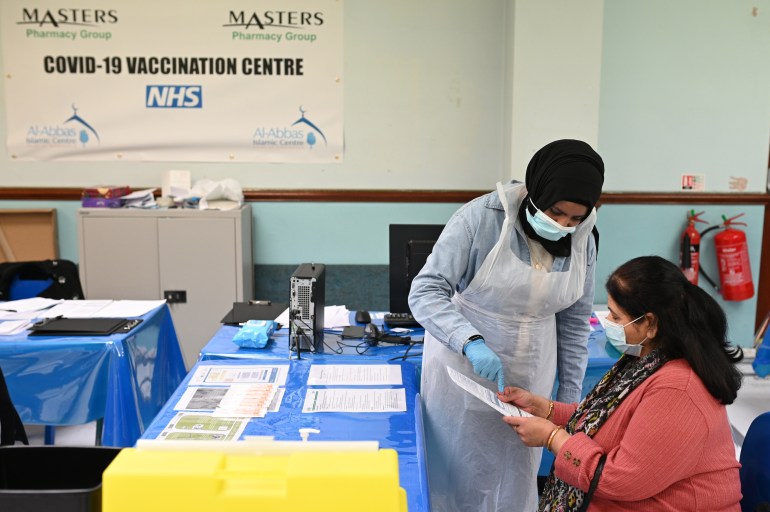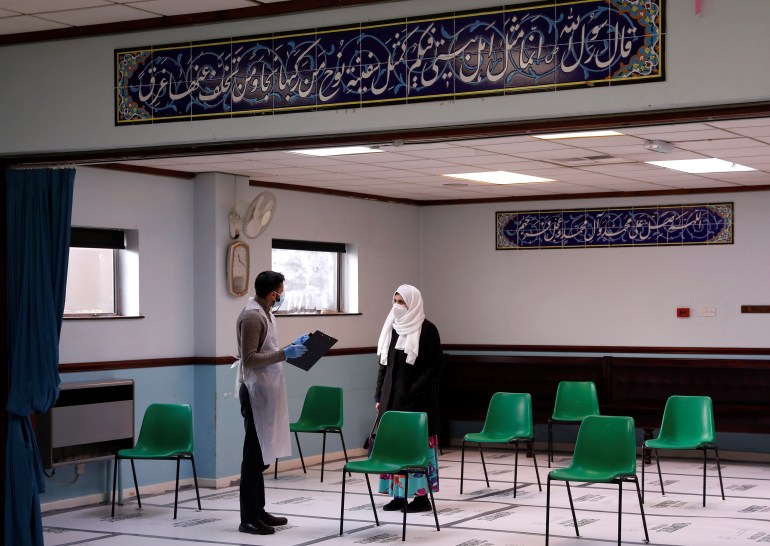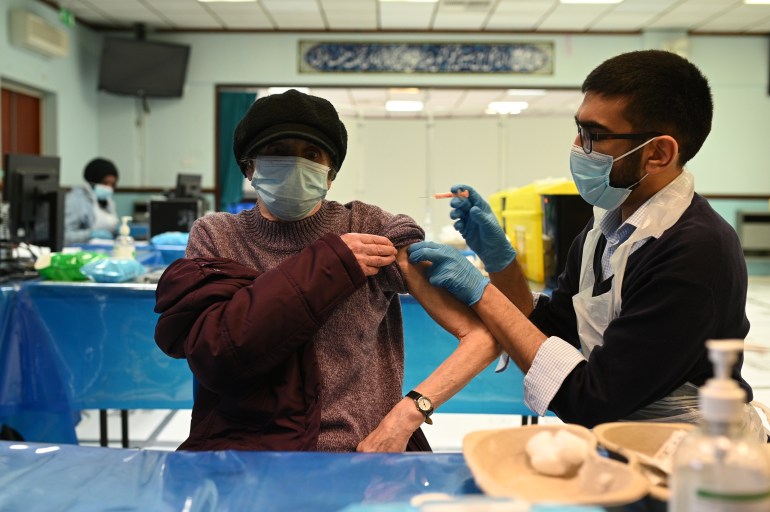In the UK, Muslims find comfort in receiving vaccines at mosques
In a bid to reassure ethnic minority communities about the vaccine, places of worship have been converted into temporary clinics.

London, United Kingdom – When 60-year-old Shenaz Sajan, a British woman from the English Midlands, learned more about COVID-19, she was hesitant about the vaccines on offer, and hoped that if she needed to, she could fight off the virus with a plant-based diet.
“But I got a lot of information, guidance and reassurance from the mosque that the vaccine was halal and permissible,” she told Al Jazeera, referring to the Al-Abbas Islamic Centre in Balsall Heath, the first mosque approved as a vaccination centre by NHS England.
Keep reading
list of 4 itemsCOVID: How has the UK managed to master the vaccine roll-out?
As the UK reaches a grim pandemic milestone, the nation mourns
In Pictures: Vaccinations roll out in stadiums, cathedrals, buses
“It was a very pleasant experience having it in a trusted place like the mosque.”
Sajan is among the dozens of people who have received the Oxford-AstraZeneca vaccine at the centre, which is in inner-city Birmingham, since January 21.

The UK has won praise for its vaccination roll-out, having already administered a first dose to about 10 percent of the population, or more than 12 million people.
Vaccination centres have been set up in expected locations such as pharmacies but also in cinemas, a London football ground and other places of worship such as a Hindu temple.
On Sunday, hundreds of people were vaccinated at a pop-up clinic at the East London Mosque, which serves the UK’s largest Muslim community.
In Birmingham, Al-Abbas Islamic Centre vaccinates two people at a time in a multi-purpose hall. The mosque expects to vaccinate up to 500 people in the upcoming weeks.
Nuru Mohammed, the mosque’s imam, said the idea to convert the space into a clinic was to help people who were not “well-informed” about the vaccination campaign, amid fears and false information that had been circulating among the Muslim community.
“We are excited that people are coming to receive their jabs,” he told Al Jazeera. “I would like to take this opportunity to encourage my dear brothers and sisters to verify every bit of information they receive with trusted medical experts such as NHS staff.
“It will definitely send a strong positive message to the wider Muslim community, not only here in Birmingham, but in the entire country, because I think this is the first mosque within the country opening its doors for vaccination to take place.”

Health workers at the mosque began by giving vulnerable and elderly people, from all backgrounds, the shots, including 82-year-old Shaukat Ali.
“I am at peace now,” Ali told Al Jazeera, after receiving the vaccine. “I will encourage my family members to go for it when invited by the NHS.”
Several studies in the UK have shown that vaccine hesitancy is more prevalent among people from ethnic minority backgrounds, with fears driven in part by a mistrust of the health system.
Black, Asian and other ethnic minority Britons are less likely to take up an offer of the vaccine, as conflicting information swirls around on social media networks and within some communities.

Husna Khimji, 69, received the vaccine at Al-Abbas, along with her 70-year-old husband.
“My aunties aged 84 and over were a bit reluctant to take the vaccine, but after I told them in the family WhatsApp group that I had it, they also went to take it at the mosque.
“I was very positive about taking the vaccine at the mosque … We are people of faith and trust our mosque committee, which includes professional doctors. They have been talking to us, telling us why we should take the vaccine, and explaining that all these myths have no basis.”